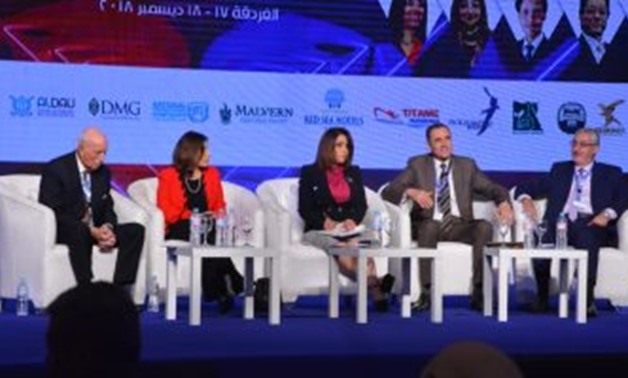
Panelists at a session in “Egypt Can by Education.” December 18, 2018. Press Photo
CAIRO - 18 December 2018: “Egypt Can by Education” concluded on Tuesday after holding eight sessions on its second day including “Ask the Experts” session and came up with 13 recommendations. Those are
1) Seek the help of expert participants in the event to evaluate educational establishments, curricula and teaching methods, and put a strategy to develop the education system to match international criteria.
2) Put more emphasis on technical education in schools and universities, and allow its graduates to obtain higher degrees after acquiring years of experience.
3) Promote English language learning.
4) Study market needs in Egypt and the region to produce qualified graduates and eliminate unemployment.
5) Benefit from the Red Sea governorate’s experience in securing free school meals as it linked families and schools, and decreased dropouts.
6) Promote discipline and values through art.
7) Give incentives to investors to establish technical education centers, and take part in the dual technical education system developed by the Ministry of Education for students to work while studying which improves their qualifications.
8) Promote extracurricular activities.
9) Develop learning mechanisms that meet the needs of the disabled students.
10) Seek the cooperation by expert expats to teach the families and friends of disabled students how to deal with them.
11) Encourage foreign universities and educational establishments to operate branches in Egypt and offer degrees in lower fees to boost competitiveness among educational entities in Egypt.
12) Encourage entrepreneurship and teach youth how to turn their innovative ideas into successful businesses.
13) Use digital alternatives for professional development and teacher training programs. That is part of the National Strategy for Education Development
“Ask the Experts”
The panelists were Secretary General of the Advisory Council of Egypt’s Scientists and Experts Mervat el-Dib, Hesham al-Askary, Mansour al-Matbouli, Hany al-Kateb, and Mohamed Mahmoud Ibrahim.
Askary is professor and director of Computational and Data Science Graduate Programs at California’s Chapman University. He has expertise in Global Climate Change; Earth Systems; Remote Sensing; Aerosols; Natural Disasters; Marine Habitats. Askary co-developed Egypt’s first Dynamical Solar Atlas that serves to maximize benefit solar energy.
Matbouli is professor at Department for Farm Animals and Veterinary Public a Health, Clinical Division of Fish Medicine at University of Veterinary Medicine, Vienna.
Kateb is a forest biometrician who is member of the Presidential Advisory Council of Egypt’s Scientists and Experts, senior scientist at Germany’s Technische Universität München (TUM) and an international senior consultant. He has experience in resource management, forestry, agri-business, and implementation of interdisciplinary projects.
Ibrahim is the director of the Horyou-5 satellite studies project in Japan, and a senior computer systems architect at the Architecture Design Center in Japan's Hitachi Ltd. Ibrahim supervised the creation of the first Egyptian satellite computer that was designed and assembled at Benha Electronics Company, affiliated to the Military Production Ministry.
Education Sessions
The second session was on the role of teachers training and arts in creating extraordinary schools. It had as panelists Head of Education Sector at Misr Al Kair Foundation Hanan al-Rihani, Sarah Fahmy, Hussein Zanaty, Dina Ghobashy, and Amal Farah.
Fahmy serves as vice-president of communications at the United Government of Graduate Students (UGGS) and representative of the Department of Theatre and Dance UGGS.
Zanaty is the executive director of Egypt Japan Friendship Association (EJFA) and a postdoctoral researcher at Kitami Institute of Technology. Ghobashy is a principal consultant at EdTech Ventures. Farah is an editor at Catalyst Education based in Australia.
The third session was on linking scientific research and education with market needs. The fourth session was on success stories in medical education. The fifth session was on technical education for industrial and services development.
The sixth session was on developing the skills of Egyptian students, and the integration of disabled students. The seventh session was on digital learning. The last session was on entrepreneurship and the role of education to promote innovation.
“Egypt Can” is a series of conferences held annually with the aim of giving Egyptian expats the opportunity to present their visions for different fields of development, and their proposals to improve various sectors.
The conference is organized by the Ministry of State for Emigration and Expatriates Affairs. The Ministry of Education and Technical Education, and the Ministry of High Education and Scientific Research contributed to this edition.
The education theme was selected in light of an announcement by President Abdel Fatah al-Sisi to label 2019 an education year.
Minister Makram announced that the next edition will be titled “Egypt Can by Effort” calling for expats who proved themselves abroad to present their stories. The event next year will be held in collaboration with the Ministry of Social Solidarity.
Red Sea Governor Ahmed Abdalla said in the opening on Monday that he looks forward to a new education system that gives value to understanding to replace the current one which depends on memorization. The governor revealed that he succeeded to offer hot meals to students in schools for free.
The Egyptian Food Bank secured the food, and a number of women learnt cooking by chefs working in the governorate’s hotels and resorts. The meals for each school are prepared by mothers of some of the students in the same school.

Comments
Leave a Comment